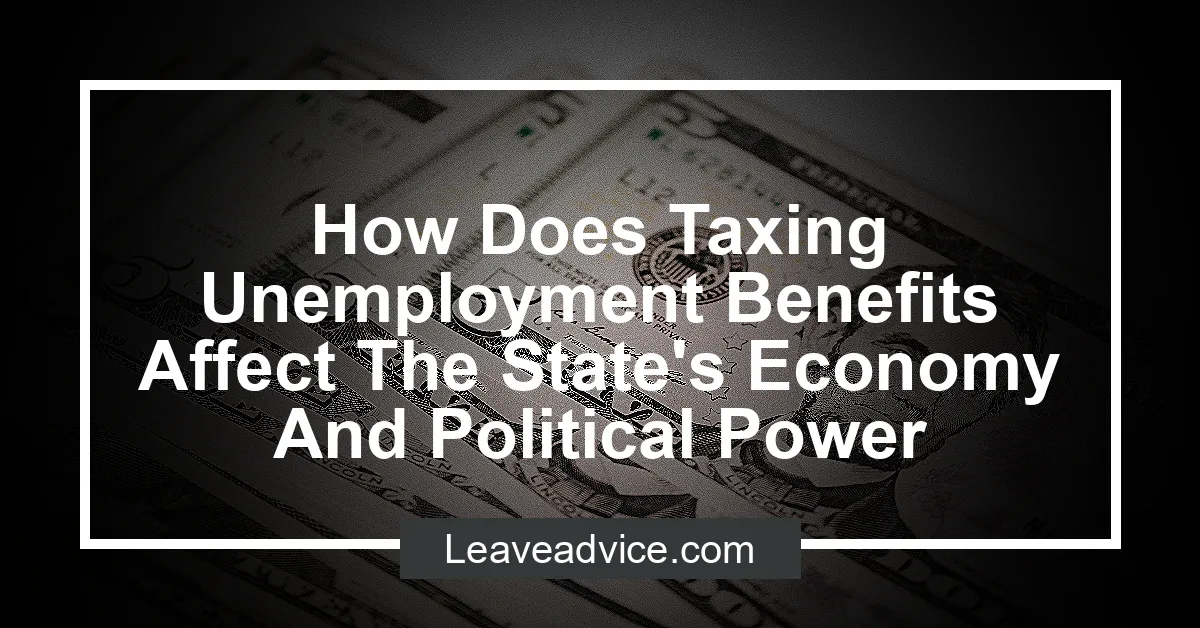How Does Taxing Unemployment Benefits Affect The State’s Economy And Political Power


Taxing unemployment benefits can have an impact on the state’s economy by reducing the disposable income of individuals receiving the benefits. This reduction in disposable income can lead to decreased consumer spending, which can negatively affect businesses and overall economic growth.
Taxing unemployment benefits can also have political implications, as it may be seen as a way for the government to generate additional revenue. This approach could potentially be unpopular among voters, especially during times of economic hardship when many individuals rely on unemployment benefits to make ends meet.
Furthermore, taxing unemployment benefits may also influence the decisions of policymakers and politicians, as they weigh the potential impacts of such taxation on the overall welfare of the population and the stability of the economy.
The Impact on the State’s Economy
Increased government revenue: Taxing unemployment benefits contributes to increased government revenue, potentially providing funds for public services and infrastructure development.
Reduction in disposable income for unemployed individuals: Taxing unemployment benefits can lead to a reduction in disposable income for unemployed individuals, impacting their ability to cover essential expenses and maintain their standard of living.
Impact on consumer spending: With reduced disposable income, consumer spending may decrease, affecting the overall economy and impacting businesses that rely on consumer demand.
Effect on poverty rates and social welfare programs: Taxing unemployment benefits may potentially increase poverty rates and place a strain on social welfare programs, as individuals struggle to make ends meet without adequate financial support.
| Impact | Details |
|---|---|
| Increased government revenue | Taxing unemployment benefits contributes to increased government revenue, potentially providing funds for public services and infrastructure development. |
| Reduction in disposable income for unemployed individuals | Taxing unemployment benefits can lead to a reduction in disposable income for unemployed individuals, impacting their ability to cover essential expenses and maintain their standard of living. |
The Political Implications
Political debates and controversies
Taxing unemployment benefits sparks heated political debates and controversies. Opponents argue that it places an additional burden on individuals already facing financial hardship, while proponents emphasize the need for revenue to support state programs.
This contentious issue often leads to intense discussions in legislative sessions and public forums, stirring emotions on both sides.
Influence on public opinion and voter sentiment
The taxation of unemployment benefits can significantly influence public opinion and voter sentiment. Individuals directly affected by these policies may feel disenfranchised and express their disapproval at the polls.
Moreover, the general public’s perception of how the government manages unemployment benefits taxation can sway their support for political candidates, thereby shaping the outcomes of elections.
Political promises and policies related to unemployment benefits
Candidates often make promises and propose policies related to unemployment benefits during their campaigns. These pledges may encompass commitments to reform the taxation of such benefits, aiming to win over the electorate by addressing a pressing economic concern.
Consequently, the manner in which politicians handle this issue can greatly impact their political standing and future prospects.
Lobbying efforts and interest group involvement
Lobbying groups and special interest organizations play a pivotal role in influencing decisions concerning the taxation of unemployment benefits. They actively engage with lawmakers to advocate for policies aligning with their objectives.
Their involvement often translates into extensive efforts to promote or oppose specific legislation, shaping the political landscape and the trajectory of related policies.
Historical Perspective
The evolution of unemployment benefit taxation in the United States has been a crucial aspect of the country’s economic and political landscape. It all began in the early 20th century, with an emphasis on providing a safety net for individuals facing temporary joblessness.
During the Great Depression, the U. S. witnessed its highest unemployment rate of 24.7% in 1933, prompting the urgent need for comprehensive unemployment benefit programs to stabilize the economy.
Evolving from the 1935 Social Security Act, the unemployment insurance system underwent significant changes, including the reformation of financing through Federal tax base alterations in 1939. These changes reflected the dynamic nature of unemployment benefit taxation, shaping its effects on the state’s economic and political dimensions over time.
Policy changes have had direct impacts on the state’s economy and politics, indicating the interconnectedness of unemployment benefit taxation with broader societal outcomes. For instance, during the pandemic, temporary unemployment programs substantially increased coverage and duration, alleviating hardship and providing stability to a rapidly declining economy.
The political arena has been a hotbed for debates and decisions regarding unemployment benefit taxation, as policymakers strive to strike a balance between economic sustainability and social welfare. Recent legislative acts such as the Consolidated Appropriations Act, 2021, have reflected the ongoing discourse on unemployment insurance, continuously shaping its functionality and impact on both the economy and the political landscape.
| Year | Key Policy Change | Effect |
|---|---|---|
| 1935 | Introduction of Social Security Act | Laid the foundation for unemployment insurance |
| 1939 | Redistribution of Federal unemployment tax base | Altered financing, impacting economic stability |
| 2020 | Enactment of Continued Assistance for Unemployed Workers Act | Extension of unemployment programs for economic stabilization |
Economic Theory and Analysis
Theoretical arguments in support of taxing unemployment benefits
Theoretical arguments supporting the taxation of unemployment benefits suggest that it could provide a disincentive for individuals to remain unemployed for longer periods. Taxing unemployment benefits aims to encourage individuals to actively seek employment and re-enter the workforce, thereby contributing to the overall economic growth of the state.
Counterarguments from economic experts and policymakers
Economic experts and policymakers, however, argue that taxing unemployment benefits could disproportionately affect those who are already financially strained due to job loss. Critics contend that taxing these benefits may further exacerbate the financial burden on the unemployed, potentially hindering their ability to meet basic needs and find suitable employment opportunities.
Potential long-term economic implications
The potential long-term economic implications of taxing unemployment benefits are multifaceted. While proponents argue that it could lead to increased labor force participation and economic productivity, opponents raise concerns about its impact on the overall well-being of unemployed individuals and their families.
Additionally, the political implications of taxing unemployment benefits could shape public perceptions of government policies and influence future election outcomes.
| Pros | Cons |
|---|---|
| Encourages labor force participation | Disproportionately impacts the |
| Potential increase in economic | financially strained |
| productivity | individuals |
By considering the varied perspectives and implications, policymakers can make informed decisions regarding the taxation of unemployment benefits, weighing the potential economic benefits against the possible challenges faced by the unemployed population.
Case Studies of States Implementing Taxation
Examples of states with taxation policies in place
| State | Taxation Policy |
|---|---|
| California | Imposes state income tax on unemployment benefits |
| New York | Taxes unemployment benefits as regular income |
Economic and political outcomes in those states
-
Economic Impact: Taxing unemployment benefits has led to increased state revenue, contributing to economic stability and funding for essential services. However, it has also resulted in decreased disposable income for jobless individuals, impacting consumer spending and overall economic recovery.
-
Political Implications: The taxation of unemployment benefits has sparked debates among policymakers and constituents. While some argue that it ensures fairness in the tax system, others express concerns about the financial burden on the unemployed population and propose alternative solutions to revenue generation.
Lessons learned and potential best practices
-
Equitable Taxation: States can explore progressive tax structures to mitigate the impact of taxation on vulnerable groups while ensuring a fair distribution of tax burdens across the population.
-
Balancing State Budgets: Implementing taxation on unemployment benefits necessitates a balanced approach to maximize revenue without disproportionately affecting those reliant on such benefits during challenging times.
By closely examining the examples of California and New York, we can gain valuable insights into the complexities of taxing unemployment benefits and its multifaceted impact on the economy and political landscape.
Feel free to share your thoughts on how these tax policies influence the economic and political realms in your state!
Public Perception and Social Impact
Public opinion on taxing unemployment benefits
Public opinion on taxing unemployment benefits varies widely. Some individuals believe that taxing unemployment benefits is necessary for economic stability and fairness, as it contributes to the overall tax revenue.
On the other hand, there is a significant portion of the population that opposes taxing these benefits, viewing it as punitive to those already in a financially precarious situation.
Perception of fairness and social justice
The perception of fairness and social justice regarding taxing unemployment benefits is a hotly debated topic. Many argue that taxing these benefits places an unnecessary financial burden on those who are already facing hardship due to unemployment.
It is often seen as an unjust practice, especially when considering the financial strain it places on individuals and families who rely on these benefits as a crucial source of income during challenging times.
Impact on social cohesion and community relations
Taxing unemployment benefits can have a direct impact on social cohesion and community relations. It can breed resentment and dissatisfaction among those affected, leading to a sense of alienation from the broader community.
Furthermore, it may create divisions as some advocate for the fair treatment of the unemployed, while others prioritize economic stability through tax revenue.
The Role of Unemployment Benefits in the Social Safety Net
Purpose of unemployment benefits
Unemployment benefits serve as a vital safety net, providing financial assistance to individuals who have lost their jobs through no fault of their own. They offer a cushion for displaced workers, helping them meet their basic needs while they search for new employment opportunities.
The primary purpose is to mitigate the economic impact of unemployment on individuals and their families.
Potential effects of taxation on the efficacy of the safety net
Taxing unemployment benefits could potentially reduce the efficacy of the safety net by placing additional financial strain on the already vulnerable individuals receiving these benefits. It may lead to a decrease in the overall support provided by the benefits, impacting the ability of unemployed individuals to sustain themselves and their families during difficult times.
Ethical considerations and moral implications
From an ethical standpoint, taxation of unemployment benefits raises questions about fairness and social responsibility. It puts forward the ethical dilemma of imposing additional financial burdens on individuals who are already experiencing hardship.
Moreover, it challenges the moral obligation of society to provide support for those in need, potentially undermining the fundamental principles of social welfare.
| Pros | Cons |
|---|---|
| Provides financial support for the unemployed | Taxation may reduce the support provided |
| Helps individuals sustain themselves | Places additional financial strain on recipients |
| Mitigates the economic impact of unemployment | Raises ethical concerns about fairness and social responsibility |
The role of unemployment benefits in the social safety net is crucial for supporting individuals during challenging times, and it’s important to carefully consider the potential impact of taxation on their efficacy and the ethical implications surrounding it.
Potential Alternatives and Reforms
Alternative revenue sources for state governments
- One alternative revenue source for state governments could be the implementation of a carbon tax, which could generate substantial income while also promoting environmental protection.
- Another option is the introduction of a luxury goods tax, targeting high-end consumer products to generate additional revenue for state governments.
Policy reforms to address economic and political concerns
- Implementing a progressive income tax system can help address economic concerns by ensuring that higher earners contribute a larger share of their income to support state infrastructure and programs.
- Policy reforms should also focus on promoting job creation and investment incentives to stimulate economic growth and reduce unemployment rates.
Comparative analysis of different approaches
- When comparing different approaches, it is crucial to analyze the impact of each policy on the overall economic well-being of the state and its citizens.
- Additionally, evaluating the political implications of each approach is vital to ensure that the chosen reforms align with the state’s long-term political stability and public support.
| Revenue Source | Impact |
|---|---|
| Carbon Tax | Environmental and financial benefits |
| Luxury Goods Tax | Targeted revenue from affluent consumers |
The Influence of Partisan Politics
Partisan perspectives on taxing unemployment benefits
Unemployment benefits taxation is often viewed differently by political parties. Democrats may lean towards preserving unemployment benefits and imposing taxes on them as a means of funding other social programs, while Republicans might prioritize reducing taxes on unemployment benefits to stimulate individual economic growth.
Role of party platforms and ideologies
The role of party platforms and ideologies significantly impacts their stance on taxing unemployment benefits. For instance, conservative platforms may advocate for lower taxes on unemployment benefits to align with their economic policies, aiming to reduce government intervention.
Conversely, liberal platforms may support higher taxation on unemployment benefits to fund social welfare programs and reduce income inequality.
Political polarization and its impact on policy decisions
Political polarization strongly influences policy decisions regarding the taxation of unemployment benefits. The divide between parties often results in gridlock, making it challenging to reach a consensus on how to tax unemployment benefits.
This polarization can hinder effective policymaking and prevent necessary reforms in addressing economic inequalities.
| Party | Taxation Approach |
|---|---|
| Democrats | Advocates for higher taxes on unemployment benefits to fund social welfare programs |
| Republicans | Favors lower taxes on unemployment benefits to stimulate individual economic growth |
The conflicting partisan perspectives and ideologies significantly influence policy decisions related to taxing unemployment benefits. This often leads to a lack of consensus and, in turn, affects the state’s economy and political landscape.
Global Comparisons
Comparison with taxation policies in other countries
Taxation policies vary significantly across different countries, with some nations implementing higher tax rates on unemployment benefits compared to others. For example, in Country A, unemployment benefits are subject to a flat tax rate of 15%, while in Country B, the benefits are taxed progressively based on the individual’s total income.
Cross-cultural perspectives on the issue
The cross-cultural perspectives on taxing unemployment benefits reveal contrasting attitudes and approaches. In some cultures, there is a strong belief in providing substantial support to those in need, leading to minimal taxation on unemployment benefits.
Conversely, in certain cultures, the emphasis may be on individual responsibility, resulting in higher tax rates on such benefits.
Implications for international relations and economic competitiveness
The implications of taxing unemployment benefits extend to international relations and economic competitiveness. Nations with low taxation on such benefits may be perceived as more socially supportive, potentially influencing their international standing.
Moreover, the economic competitiveness of a country can be impacted by its taxation policies, as higher tax rates may deter individuals from actively seeking employment.
Impact on Business and Labor Market Dynamics
Unemployment benefit taxation affects hiring practices as businesses may be less inclined to hire new employees when facing increased financial burdens. This can lead to a reduction in job opportunities, impacting the overall labor market and economic growth.
Effects on hiring practices
Higher taxes on unemployment benefits can lead to cautious hiring practices as businesses may seek to minimize costs due to the increased financial strain. This could result in a slower pace of job creation and potentially hinder the expansion of businesses.
Influence on labor force participation
Taxing unemployment benefits may impact labor force participation by creating a deterrent effect for individuals seeking employment. With reduced financial support, individuals may be less motivated to actively participate in the labor market, potentially leading to a decline in the workforce.
Business reactions to changes in unemployment benefit taxation
Businesses may react to changes in unemployment benefit taxation by adjusting their hiring strategies, potentially being more selective in recruitment or exploring alternative methods of workforce management. This could potentially impact employee retention and the overall stability of the labor market.
Suggested Reforms and Policy Recommendations
Expert proposals for addressing economic and political challenges
- Provide targeted tax incentives for businesses to create more job opportunities.
- Implement measures to stimulate small business growth and entrepreneurship.
- Focus on infrastructure investments to create jobs and support economic growth.
Advocacy for specific policy changes
- Advocate for the expansion of workforce training and education programs to enhance employability.
- Support policies that promote job retention and development, such as subsidized employment programs.
- Advocate for progressive taxation to ensure fairness in the distribution of tax burdens.
Potential areas for bipartisan cooperation and compromise
- Opportunities for agreement on infrastructure investment to create jobs and support economic development.
- Collaboration on workforce development initiatives to address skills gaps and enhance employability.
- Finding common ground on progressive tax policies to ensure a fair and equitable tax system.
Ethical Considerations in Taxation Policies
Ethical implications of taxing unemployment benefits
Taxing unemployment benefits can raise ethical concerns, as these benefits serve as a financial lifeline for individuals who have lost their jobs. By taxing these benefits, the government may be placing an additional burden on those who are already in a vulnerable position, potentially exacerbating their financial hardships.
It can be viewed as ethically questionable to tax individuals who are already experiencing economic distress.
Considerations of social justice and equality
From the perspective of social justice and equality, taxing unemployment benefits can be seen as unjust. It can further contribute to the economic inequality within society, as those who are already struggling financially are subjected to additional taxation on the support they receive.
This contradicts the principles of social justice and equality, as it disproportionately impacts individuals who are relying on these benefits to make ends meet.
Moral arguments for and against such taxation
The moral arguments for taxing unemployment benefits may revolve around the need for funding essential government services and maintaining a balanced budget. However, this must be weighed against the moral imperative of providing support to individuals in times of hardship.
On the other hand, arguments against such taxation are rooted in the moral obligation to protect the most vulnerable members of society and prevent further financial strain on those who are already facing challenges.
| Ethical implications | Considerations of social justice and equality |
|---|---|
| Taxing benefits can exacerbate financial hardships | Taxation may contribute to economic inequality |
| May contradict principles of social justice | Disproportionately impacts those in need |
Recommended Amazon Products for Taxing Unemployment Benefits
Here’s a curated list of products that can help you understand the economic and political implications of taxing unemployment benefits. These recommendations are based on the relevance to the topic and the potential to enhance your understanding.
Economics 101: From Consumer Behavior to Competitive Markets-Everything You Need to Know About Economics


This book provides a comprehensive overview of economic principles and their application to real-world scenarios. It can help you grasp the economic theory and analysis related to taxing unemployment benefits.
| Pros | Cons |
|---|---|
| In-depth explanation of economic concepts | Not a hands-on product |
| Highly rated by readers | Requires time to read and understand |
State and Local Public Finance


This academic textbook delves into the financial aspects of state and local governments, which includes taxation policies and economic impacts. It can provide valuable insights into the impact on the state’s economy.
| Pros | Cons |
|---|---|
| Authoritative source of information | Academic focus may be too detailed for some readers |
| Thorough coverage of public finance | Higher price point |
The Economics of Public Issues


This book explores the economic dimensions of various public policy issues, shedding light on the societal implications of taxation and welfare programs. It offers a broader perspective on social and economic impacts.
| Pros | Cons |
|---|---|
| Engaging and accessible writing style | General overview without specific focus on unemployment benefits |
| Addresses ethical considerations | Limited to public policy issues |
Unemployment, Welfare, and Social Security Disability: Issues and Proposals for Social Security Reform


This book delves into the intricacies of welfare programs and social security, providing a deep dive into the societal impacts of taxation and benefit programs. It can shed light on the role of unemployment benefits in the social safety net.
| Pros | Cons |
|---|---|
| Comprehensive coverage of social security issues | May be too specific for a general audience |
| Addresses potential policy reforms | Focus on disability benefits in addition to unemployment |
Freakonomics: A Rogue Economist Explores the Hidden Side of Everything


This best-selling book takes a unique approach to economics, revealing surprising connections between different issues. It offers a fresh perspective on economic and social phenomena, including the impact of policies on various societal aspects.
| Pros | Cons |
|---|---|
| Thought-provoking and unconventional insights | Lacks a direct focus on unemployment benefits |
| Engages readers through storytelling | Emphasis on diverse economic topics |
Top Recommended Product for Understanding the Economic and Political Implications of Taxing Unemployment Benefits
If you’re looking for the best solution for understanding the economic and political implications of taxing unemployment benefits, we highly recommend Economics 101: From Consumer Behavior to Competitive Markets-Everything You Need to Know About Economics. This book provides a comprehensive understanding of economic principles and their real-world application, making it an invaluable resource for gaining insights into this complex issue.


Ready to deepen your understanding of the economic and political aspects of unemployment benefit taxation? Check out Economics 101 today for a thorough exploration of the topic!


Conclusion
Taxing unemployment benefits can have a negative impact on the state’s economy by reducing the spending power of those receiving benefits. This can lead to a decrease in consumer spending, which in turn can affect businesses and the overall economy.
Additionally, taxing unemployment benefits may discourage individuals from seeking or accepting employment, further impacting the state’s economy.
Taxing unemployment benefits can also have political implications as it may lead to public dissatisfaction and unrest. The decision to tax these benefits can create a negative perception of the government and its policies, leading to potential backlash from the public.
This can affect the political landscape, potentially influencing elections and the support for policymakers.
Taxing unemployment benefits can create economic challenges and political ramifications for the state. It is important for policymakers to carefully consider the potential consequences of taxing these benefits and to weigh the impact on both the economy and the political environment.
















